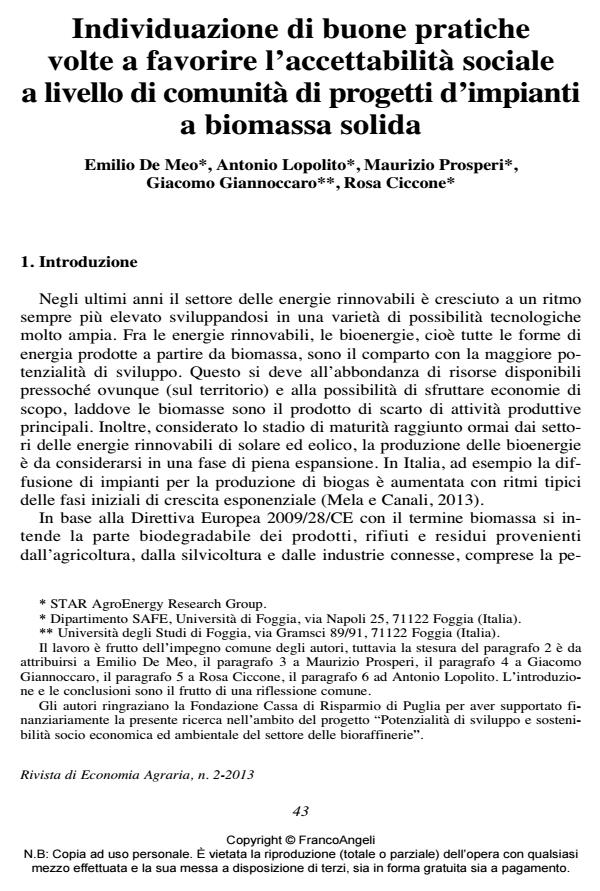Individuazione di buone pratiche volte a favorire l’accettabilità sociale a livello di comunità di progetti d’impianti a biomassa solida
Titolo Rivista RIVISTA DI ECONOMIA AGRARIA
Autori/Curatori Emilio De Meo, Antonio Lopolito, Maurizio Prosperi, Giacomo Giannoccaro, Rosa Anna Ciccone
Anno di pubblicazione 2014 Fascicolo 2013/2 Lingua Italiano
Numero pagine 20 P. 43-62 Dimensione file 703 KB
DOI 10.3280/REA2013-002003
Il DOI è il codice a barre della proprietà intellettuale: per saperne di più
clicca qui
Qui sotto puoi vedere in anteprima la prima pagina di questo articolo.
Se questo articolo ti interessa, lo puoi acquistare (e scaricare in formato pdf) seguendo le facili indicazioni per acquistare il download credit. Acquista Download Credits per scaricare questo Articolo in formato PDF

FrancoAngeli è membro della Publishers International Linking Association, Inc (PILA)associazione indipendente e non profit per facilitare (attraverso i servizi tecnologici implementati da CrossRef.org) l’accesso degli studiosi ai contenuti digitali nelle pubblicazioni professionali e scientifiche
The siting of solid biomass energy plants can be conceived as a transaction process taking place between two specific economic agents, the investor and local community. The investor is interested in obtaining the use right for local resources (e.g. area for setting; natural resources to feed the process, release of pollutants in the environment) while the community expects an increase of net benefits (es. job opportunities, induced industrial development, revitalization of the local economy). This transaction process has been analyzed according to the typical transaction costs theory, where the economic activities are conceived as the result of transactions among economic agents, which are hindered by three main obstacles: a) bounded rationality, b) opportunism, c) asset specificity. By applying the New Institutional theory approach, we treat the issue of social acceptance as a transaction cost problem. The aim is to identify the best practices adopted by biomass firms managers in order to enhance the social acceptance of solid biomass plants at local community level. In this paper we conduct a positive analysis where the methodological approach is based on the comparison of five case successful study cases. This allowed us to identify thirteen measures, capable to foster the social acceptance, and consequently to reduce the costs related to the investment.;
Keywords:Buone pratiche, accettabilità sociale, impianti a biomassa, costi di Transazione
Jel codes:Q42, Q52
- Breukers S., Wolsink M. (2007). Wind power implementation in changing institutional landscapes: an international comparison. Energy Policy, XXXV, 5: 2.737-2.750, DOI: 10.1016/j.enpol.2006.12.004
- Direttiva 2009/28/CE del Parlamento Europeo e del Consiglio del 23 aprile 2009 sulla promozione dell’uso dell’energia da fonti rinnovabili, recante modifica e successiva abrogazione delle direttive 2001/77/CE e 2003/30/CE.
- Devine-Wright P. (2005). Beyond NIMBYism: towards an Integrated Framework for Understanding Public Perceptions of Wind Energy. Wind Energy, VIII, 2: 125-139, DOI: 10.1002/we.124
- Dudek D.J., Wiener J.B. (1996). Joint implementation, Transaction Costs, and Climate Change. Parigi: OCSE.
- EU Commission (2007). Energy Technologies: Knowledge, Perception, Measures, Special Eurobarometer n. 262, retrieved from http://ec.europa.eu/public_opinion/archives/ebs/ebs_262_en.pdf.
- EU Commission (2011). Public Awareness and Acceptance of CO2 capture and storage, Special Eurobarometer, n. 364, retrieved from http://ec.europa.eu/public_opinion/archives/ebs/ebs_364_en.pdf.
- Gipe P. (1995). Wind Energy Comes of Age. New York: John Wiley & Sons.
- Gross C. (2007). Community perspectives of wind energy in Australia: the application of a justice and community fairness framework to increase social acceptance. Energy Policy, XXXV, 5: 2.727-2.736, DOI: 10.1016/j.enpol.2006.12.005
- Jobert A., Laborgne P., Mimler S. (2007). Local acceptance of wind energy: factors of success identified in French and German case studies. Energy Policy, XXXV, 5: 2.751-2.760, DOI: 10.1016/j.enpol.12.005
- Lopolito A., Prosperi M., Maruotti G., De Meo E. (2012). Valutazione dell’accettabilità sociale dei progetti di impianti a biomassa solida tramite l’impiego di Fuzzy Cognitive Maps. Economia & Diritto Agroalimentare, XVII, 2: 271-289.
- Mela G., Canali G. (2013). How Distorting Policies can Affect Energy Efficiency and Sustainability: the Case of Biogas Production in the Po Valley (Italy). Proceeding of 17th ICABR Conference, 18-21 giugno, Ravello.
- Polanyi M. (1962). Personal Knowledge: Towards a Post-Critical Philosophy. New York: Harper & Row.
- Quah E., Tan K.C. (2002). Siting Environmentally Unwanted Facilities. USA: Edward Elgar.
- Rakos C. (1998). Lessons Learned from the introduction of Biomass District Heating in Austria. Lecture held at the meeting OPET Bothnia (Norrland)/Opet Austria on 18th November.
- Upreti B.R., van der Horst D. (2004). National renewable energy policy and local opposition in the UK: the failed development of a biomass electricity plant. Biomass & Bioenergy, XXVI: 61-69.
- Williamson O.E. (1985). The Economic Institutions of Capitalism. New York and London: Collier Macmillan.
- Wolsink M. (2006). Invalid theory impedes our understanding: a critique on the persistence of the language of NIMBY. Transactions of the Institute of British Geographers, XXXI, 1: 85-91, DOI: 10.1111/j.1475-5661.2006.00191.x
- Wolsink M. (2007). Planning of renewable schemes. Deliberative and fair decisionmaking on landscape instead of reproachful accusations of non-cooperation. Energy Policy, XXXV, 5: 2.692-2.704, DOI: 10.1016/j.enpol.2006.12.002
- Wüstenhagen R., Wolsink M., Burer M.J. (2007). Social acceptance of renewable energy innovation: An introduction to the concept. Energy Policy, XXXV, 5: 2.683-2.691, DOI: 10.1016/j.enpol.2006.12.001
Emilio De Meo, Antonio Lopolito, Maurizio Prosperi, Giacomo Giannoccaro, Rosa Anna Ciccone, Individuazione di buone pratiche volte a favorire l’accettabilità sociale a livello di comunità di progetti d’impianti a biomassa solida in "RIVISTA DI ECONOMIA AGRARIA" 2/2013, pp 43-62, DOI: 10.3280/REA2013-002003